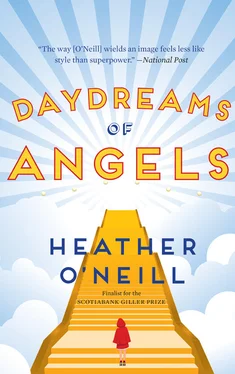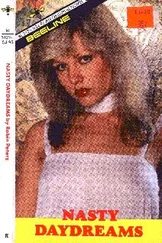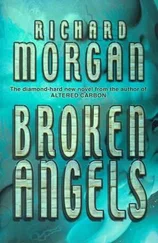All that we’d learned about the rules of good and evil was finished with. Grandfather said that, as it turned out, our souls were bigger than all of our deeds, and after life was over, it was finally freed from all that we’d ever done.
At the next station, Grandfather saw that there was an angel on the platform that all the other angels crowded over by the window to look at. They whispered that it was Lucifer. He was wearing a top hat and had blond hair down his shoulders and in his coat pocket was a book by Nietzsche. Lucifer called out loudly that he was glad he wasn’t aboard that crowded train.
Lucifer walked up to Grandfather’s car as it sat by the platform and took a marble out of his pocket. He held it up for Grandfather and the other children to see. There was a tiny trout swimming around in it. The children gasped in amazement and Lucifer winked and put it back in his pocket. He took off his top hat and shook it, causing a hundred doves to fly out, and all the children applauded.
An angel shrugged. “If you think he’s impressive, wait until you meet God. Lucifer’s fun to hang out with for a while, but you get tired of all that hocus-pocus stuff.”
And Grandfather believed it, too, because as they rode along, nearing their destination, even more wondrous things began to occur.
Grandfather opened a book that was lying on the seat beside him and he found he could read. This despite never being able to keep up in school. Grandfather never got a single word right in spelling tests. He had started skipping school and he had come to believe that he would always be an idiot, but here he was, reading. It was such a beautiful feeling that he put his hand up to his mouth and laughed out loud.
As the train moved farther along, the doll that the girl next to him was holding began to speak back. The doll asked for a little something to eat and an angel offered her a cookie. Another girl reached into her pocket and pulled out a red mitten that had been lost for months. Her grandmother had made such a big deal about her losing it, too. And another little boy, who had always been afraid of the dark, began to emanate light.
Outside the windows it started snowing and one of the children put his hand out the window and declared the snow to be as warm as bathtub water.
“Which one of you silly children wished for this bit of nonsense?” yelled an angel through a bullhorn as he watched the snow accumulate on the tracks. “You must wait until heaven before you start making your wishes. All that you’re doing now is making a big mess and delaying the schedule.”
The cheetah addressed the presence of the miracle by explaining to Grandfather that creation was easier in heaven, as you could have whatever your heart fancied. On earth, God had made sure that no one would have that power but Him. But in heaven, the angels were always pitching their preposterous ideas — new creatures that would give humans a run for their money. For instance, one angel, he’d heard, had recently proposed a tiger that was five times the regular size and came with opposable thumbs.
“Get out of my office!” God had yelled at that angel.
Suddenly, Grandfather saw that outside the window of the train, the snow had been replaced with balloons — thousands of red, blue, yellow, green and orange balloons descending slowly from out of the sky.
“One more wish,” cried the angel through his megaphone, “and so help me God, I’ll turn this train right around!”
Then as the train began its departure from the final station, a hobo carrying a small bundle in his arms came running along the platform. The hobo jumped onto Grandfather’s car at the very last minute and squeezed in between Grandfather and the cheetah. He placed the bundle he was carrying gently on his lap and pulled back the blankets to reveal a tiny baby’s face. It was smiling peacefully even though its cheeks were blue. The baby couldn’t have been more than a few minutes old.
As soon as they were settled in and the train began to move, the hobo and the baby continued a conversation they seemed to have been in the middle of. The hobo was asking the baby what it was like to be in the womb.
“You don’t remember?” said the baby. “How could you forget such a thing?”
Everyone in the car got quiet, because they too wanted to hear what it had been like in the womb.
But how could the baby explain it to them? How could he, having only lived a few minutes in the world, compare it to anything on earth? But the funny thing about the train was that not only could you speak any language, you suddenly knew the exact words to explain things, too.
There were always the right words. All you had to do was close your eyes and they would come to you. The baby closed his eyes and read the hobo’s mind and described what it was like to be in the womb in a way that the hobo would best understand.
Grandfather said he read the hobo’s mind as it read the baby’s mind, and what he read was this: “It’s a warm feeling like when Maria put her hand on your leg and then left it there the whole assembly. And how nobody knew it was there. It is like the first time you drank a bottle of warm beer on the beach and everything made you laugh. And you rode back to the city in your uncle’s car and you were squashed in the back seat with five cousins. And everyone was squeezed in so tight in the car that when someone laughed, you all jostled. In the womb, you hear people talking and their voices sound like someone you’re in love with talking in their sleep.”
Grandfather said that in that moment, everyone realized that the baby was not only describing the womb, but was also somehow describing heaven.
Everyone understood it in their own way, and for Grandfather it would be like the time a lady from his church made him a whole box of candied apples to take home. And how he hurried home with them, thinking about his brothers’ and sisters’ faces, how they’d look when he opened the box and showed them that there were enough for everyone.
All the passengers were waving their handkerchiefs as they neared the gates of heaven when suddenly Grandfather was back in the world, alive, his mother and siblings pouring cups of Earl Grey tea onto his face.
“And it’s a good thing for you too,” Grandfather told us, “because otherwise, you’d never have been born.”
“But that story’s really hard to believe,” my brother said, and I nodded my head in agreement.
“That’s exactly what the cheetah said happened to him!” shouted Grandfather. “He wasted his breath trying to explain what went on above to the other cheetahs, but no one believed him.” Grandfather then shrugged his shoulders, leaned back in his armchair and left it at that.
THE DREAMLIFE OF TOASTERS
In the year 2089, due to unprecedented advances in the field of bioengineering, androids were invented and introduced into the general population. From all outward appearance, they seemed to be exactly like people. But although their cognitive skills were similar to those of humans, they were unable to experience the same feelings and sensations. Most emotions were deemed unnecessary for their specific function in the world, so rather than possessing the regular gamut of human emotions, they were instead endowed with an innate amazement at mathematical problems and repetitive actions. For this reason, to them, working in factories, laboratories and engineering plants was most enjoyable, and because of their contributions, the human workday was reduced from eight hours to two.
Androids were made with better eyesight than humans so that they could work on the tiniest computer parts. A side effect of this provision was that when they looked up into the sky at night, they were able to perceive thousands more stars, thousands more configurations and astral phenomena than the average human eye could ever discern. And so when they walked at night, they could not help but look up into the sky and marvel. In fact, this became the easiest way to tell an android from the general human population. Androids were the ones on the street with their briefcases dangling at their sides, staring up at the stars in wonder. For this reason, androids were not given driving licences. It led to too many accidents, this ability to be struck by perfect things.
Читать дальше












